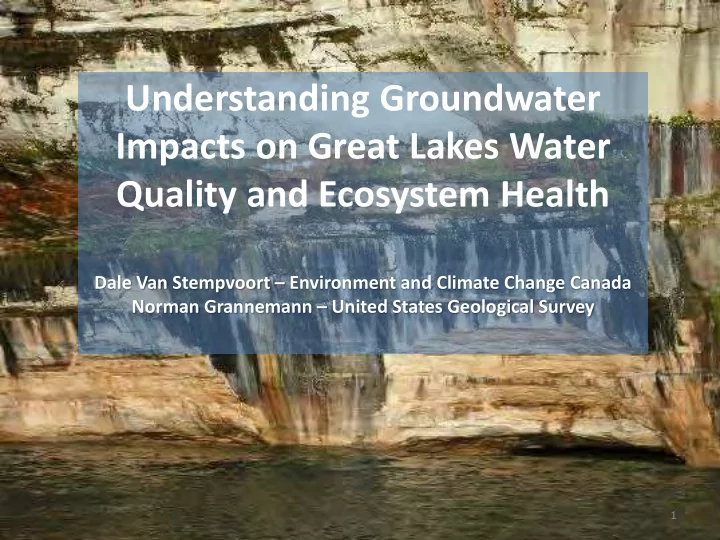

Understanding Groundwater Impacts on Great Lakes Water Quality and Ecosystem Health Dale Van Stempvoort – Environment and Climate Change Canada Norman Grannemann – United States Geological Survey 1
Why is there a Groundwater Annex in the Great Lake Water Quality Agreement? Source: Parks Canada 2
Evolution of Groundwater focus in the Great Lakes Water Quality Agreement Annex 16, Pollution from Contaminated Groundwater 1972 1978 1987 2012 No reference to Annex 8, groundwater Groundwater
The original Great Lakes Water Quality Agreement (GLWQA, 1972) did not mention groundwater President Nixon and Prime Minister Trudeau sign the GLWQA in 1972 4
1972: Very little known about groundwater 5 Focus of 1972 GLWQA: water quality of Great Lakes
Revised GLWQA 1978: Recognition of "Great Lakes Basin Ecosystem" Some attention shifting to surrounding basin 6 Still focused on water quality of Great Lakes
1978: The Love Canal disaster changed everything 7
1987: A new Annex (16) addressing “Pollution from contaminated groundwater” Source: Environment and Climate Change Canada: https://www.ec.gc.ca/eau-water/ 8
2000: The “ Walkerton tragedy” resulted in wide awareness of groundwater issues 9
Growing recognition that groundwater contamination is widespread 10
Groundwater has many positive roles in the Great Lakes Basin Source: Fisheries and Oceans Canada 11
A more complete picture of groundwater is emerging …… • Its interaction with surface water is complex and happens in both directions Source: Harvey and Gooseff, 2015 12
Latest revision of the GLWQA (2012) • Provided an opportunity to take a more holistic approach to groundwater 13
Groundwater Annex of the 2012 Great Lakes Water Quality Agreement Enhancing Coordinating groundwater groundwater science and management understanding actions science needs
Progress has been made: (a) Groundwater Annex report, (b) draft groundwater indicator Preparation of draft 2016 Release of Annex “state of Groundwater Quality sub- science” report indicator Draft Annex “state of 2015 science” report provided for review 2014 Groundwater indicator task team established Groundwater Annex 2013 Subcommittee established 15
The Annex report (2016) summarizes the state of the science, including science gaps 16
The Annex report (2016) focuses on multidisciplinary issues • Coastal wetland along Lake Huron strongly affected by seepage of groundwater Near Tobermory, Ontario Photo: Martha Allen, Parks Canada Agency. 17 17
The draft “Groundwater Quality sub- indicator” (2016) indicates data gaps Last GLWQA • Indicator remaining to be developed • Addresses GLWQA’s General Objective (viii): “be free from the harmful impact of contaminated groundwater” • Based on data from available monitoring networks (USGS, Ontario MOECC) 18
Preliminary assessment based on 2000-2015 nitrate and chloride data from shallow groundwater (≤ 40 m below ground surface) undetermined fair good fair fair fair 19
Closer view of part of the same map good fair fair fair 20
Future role of Groundwater Annex: communication and coordination related to binational and domestic actions Enhancing Coordinating groundwater groundwater science and management understanding actions science needs
Progress: Domestic Actions Ontario Geological Survey: Ohio State University: 2016 Ambient Groundwater Begins project on surface Geochemistry program for water-groundwater and Sudbury area initiated dissolved phosphorus Ontario Geological Survey: 2015 Release of results of Ambient Groundwater Geochemistry program for southern US Geological Survey: 2014 Ontario publishes “Circular on Water Quality in Glacial Aquifer Environment and Climate System” which includes the Change Canada: Initiates a Great Lakes 2013 groundwater project (phosphorus loading to surface water) under Lake Simcoe/South-eastern Georgian Bay Clean-Up Fund 22
Release of data & maps for southern Ontario ( Ambient Groundwater Geochemistry, 2015) provides very detailed “one-time” information http://www.mndm.gov.on.ca/en/mines-and-minerals/applications/ogsearth/ambient-groundwater-geochemistry 23
Statistically significant changes in nitrate in groups of wells (1988 to 2010) USGS Circular 1352: “Water Quality in Glacial Aquifer System in Northern United States” (2014) Direction of change Magnitude of change Increase Decrease (mg-N)/L Less than 0.1 0.1 to 0.5 Greater than 0.5 No significant change
Groundwater Annex Priorities for Action (2017-19) Priority for Action 1. Develop better tools to assess groundwater – surface water interaction and use them to assess regional-scale flow of groundwater to surface waters in the Great Lakes Basin. • Based directly on major science needs identified in the Annex report. • Projects underway to support this priority: Michigan, Ontario, Natural Resources Canada, universities 25
Groundwater Annex Priorities for Action (2017-19) Priority for Action 2. Undertake a focused assessment of the geographic distribution of known and potential sources of groundwater contaminants relevant to Great Lakes water quality. • Based directly on major science needs identified in the Annex report. • Projects underway to assess groundwater transport of phosphorus to surface water: Environment and Climate Change Canada, Ohio State University 26
Groundwater Annex Priorities for Action (2017-19) Priority for Action 3. Advance monitoring, surveillance and assessment of groundwater quality in the Great Lakes Basin. • Based directly on major science needs identified in the Annex report. • Continuation of domestic programs (e.g., monitoring programs, Ontario’s Ambient Groundwater Geochemistry) • Further review, reporting on Groundwater quality sub-indicator 27
Recommend
More recommend